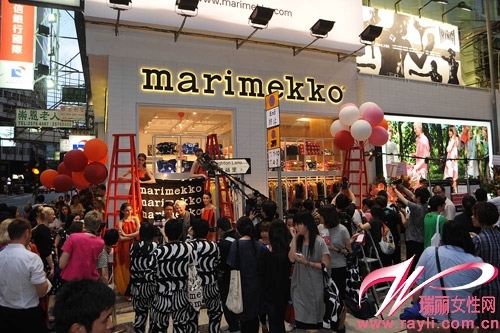Finnish fashion entrepreneur eyes Chinese market
 0 Comment(s)
0 Comment(s) Print
Print E-mail Xinhua, May 28, 2013
E-mail Xinhua, May 28, 2013
"There are so many people who no more want to show that I am rich, wealthy and successful, but they rather want to show this is who I am, this is my identity," a Finnish fashion entrepreneur said when analyzing Chinese fashion market.
|
|
| Marimekko opened its first store in Hong Kong's fashion and design district Causeway Bay on May 3, 2012. [rayli.com.cn] |
After years of study on the trend of China's economical development and consumption habits, Marimekko, a top fashion brand originating in Finland, is to open stores in Beijing and Shanghai this summer.
"In the 1980s and 1990s Chinese people's consumption was mostly for attracting others' admiration. However, after entering the new millennium, Chinese consumers are more and more willing to show their individualities," said Mika Ihamuotila, CEO of Marimekko.
Five years ago, when his company did its first research in China, he felt that the market wasn't that matured. "Many successful Chinese had handy opportunities to buy luxury fashion products, so many people have those same luxury brands."
But during the last two years, there seemed to be a really big difference. "We see, for instance, that Chinese fashion blogs are talking very much about the new, different brands that represent authenticity rather than just Bling Bling luxury," Ihamuotila said.
"I see that the next 5 years is going to be the big evolution of Chinese consumer market. Next 5 to 10 years, it's happening in this very moment," Ihamuotila told Xinhua in an exclusive interview.
According to Ihamuotila, a decade ago, similar changes of consumption concept happened in Japan. In 1980s, various luxury brands were seen everywhere in Tokyo, Osaka and Kyoto. "But People have got bored of that, they want something more authentic. If you go to the most fashionable streets, in Tokyo for instance, you see totally different brands," he said.
"You see the same change in New York that happened 15 years ago," said Ihamuotila, referring to the upper 5th Avenue famous for luxury brands.
With the development of globalization, he believed, the signs of consumers' attitude change have unfolded in emerging markets and the change will take place more rapidly.
Ihamuotila admitted that the change of consumption inclination can not happen overnight, and the same old luxury products will not suddenly disappear from people's lives.
The opening of a chain of stores in Beijing and Shanghai in early June is Marimekko's first step in the Chinese mainland, although similar strategies have been proven successful in the pacific region for decades.
Ihamuotila said the move was based on the expectaion of consumption trend, the effort to expand domestic needs, and the continuous economic growth.
He predicted that the purchasing power of Chinese consumers would become bigger.
"Many western economists and bankers are worrying the growth rate of the Chinese economy. In my opinion even it goes down to 5 percent, it's still such a strong growth rate, comparing to the European and the U.S."






